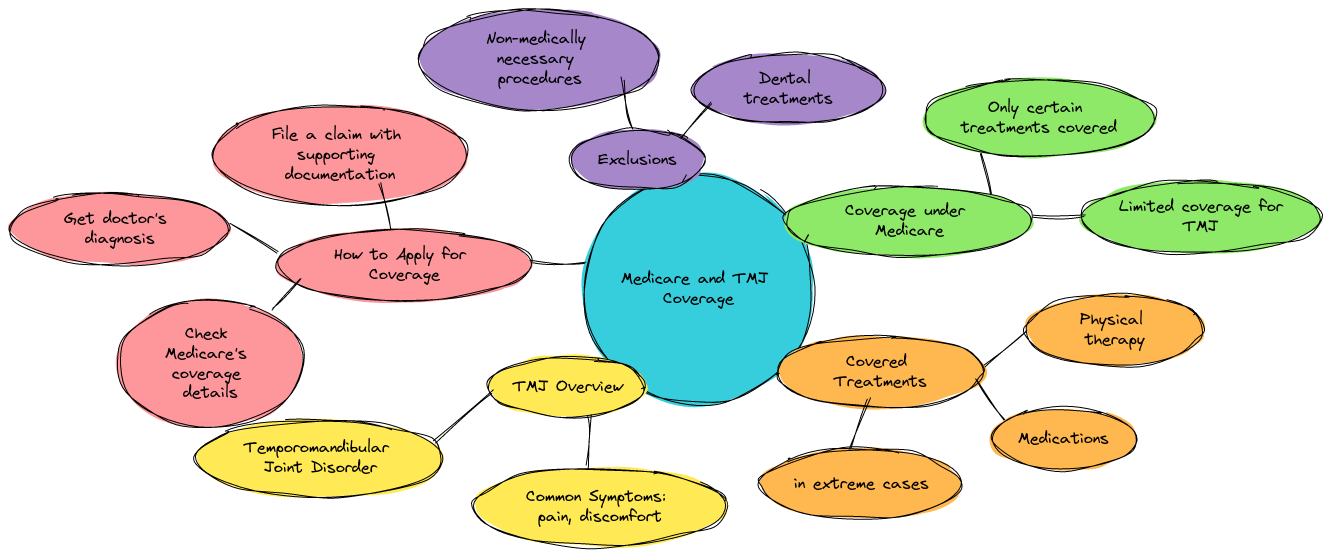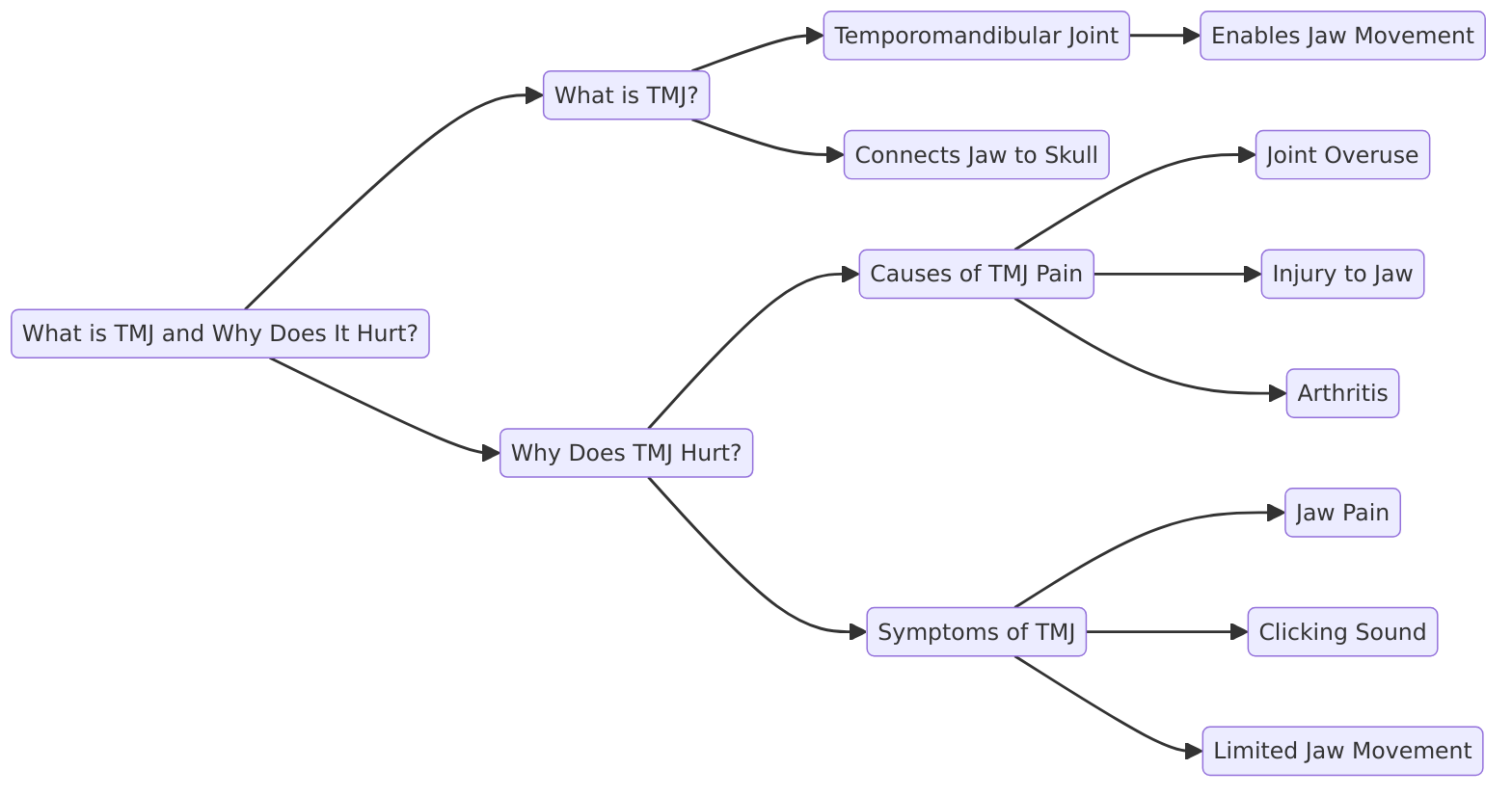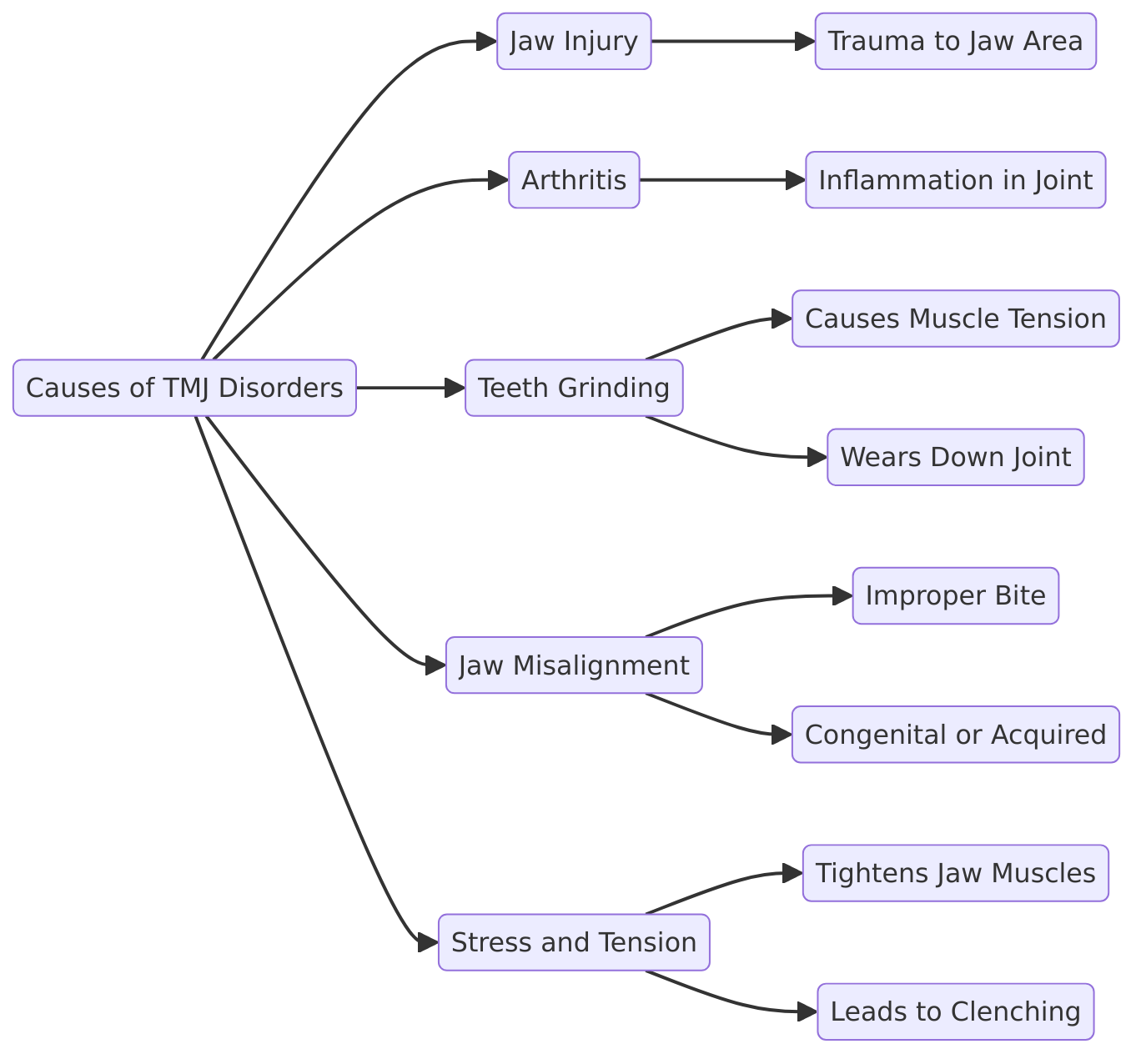Medicare and TMJ Coverage: A Guide
When your jaw joint is clicking and popping like a horror movie, you know you have Temporomandibular Joint (TMJ) disorders. This can cause orofacial pain that makes eating, talking, or even yawning feel like a face workout. Medicare can be confusing, but we’re here to break it down without making you grind your teeth (which, by the way, could make things worse).
What is TMJ and Why Does It Hurt?
TMJ disorders are problems with the jaw joint and muscles that control the movement of your jaw. If you’ve ever had a dull ache or sharp pain while chewing or opening your mouth wide, your temporomandibular joint isn’t happy with you. Some common symptoms include jaw pain, popping or clicking when opening or closing your mouth, and difficulty chewing. Sometimes, TMJ pain is accompanied by earaches, headaches, and even neck or shoulder discomfort. In other words, it’s a pain in the jaw—and then some.
Causes of TMJ Disorders
Several things can cause TMJ disorders; teeth grinding (bruxism) is one of the biggest. Other causes are jaw injuries, arthritis, or simply your jaw being misaligned. Stress is also a factor, because let’s face it, who doesn’t clench their teeth when the printer jams for the fourth time in an hour?
Medicare and TMJ Coverage
Find Medicare Plans in 3 Easy Steps
We can help get up to $0 monthly premium Medicare plans
When it comes to TMJ treatment, Medicare coverage can be like solving a riddle. Medicare doesn’t cover routine dental care, and TMJ is between medical and dental treatment. However, if TMJ treatment is medically necessary, Medicare may cover some of the costs. For example, if you need TMJ surgery and you’re admitted to a hospital, Medicare Part A may cover some of the costs.
What’s Medically Necessary Anyway?
This phrase—medically necessary—is the key to understanding Medicare coverage. If your doctor determines TMJ surgery or treatment is necessary for your health, not just to improve your jawline, Medicare may cover some of it. But don’t expect Medicare to cover anything that’s cosmetic or elective surgery. So, if you’re hoping for a Hollywood smile along with your TMJ relief, you’ll have to pay for that yourself!
Non-Surgical Treatment Options for TMJ
Fortunately, surgery isn’t always the first option for TMJ disorders. There are several non-surgical treatments that can help, and Medicare may cover them if they fall under Part B. These include physical therapy, prescription medications, and even some dental services that relate to your TMJ symptoms. Physical therapy can help relieve tension in the jaw muscles, reduce temporomandibular joint pain, and improve jaw movement.
Find Medicare Plans in 3 Easy Steps
We can help get up to $0 monthly premium Medicare plans
Medicare Part B and TMJ
Medicare Part B may cover TMJ treatments like physical therapy or oral appliances if they are medically necessary. But don’t get too excited yet—there’s always the deductible, co-pay, and whether the treatment is on the Medicare-approved services list. You don’t want to be surprised when you get the bill, so always double-check with your provider.
ICD-9-CM Coding
For those of you who like to get into the weeds, understanding the coding for TMJ disorders is key to proper Medicare reimbursement. TMJ disorders fall under ICD-9-CM 524.6, but don’t worry—you don’t need to memorize that. Just make sure you have the right diagnosis codes so your treatment is covered. “It’s not rocket science, but it sure feels like it sometimes,” says Henry Beltran, owner of Medicare Advisors Insurance Group LLC.
TMJ Surgery and Medicare Coverage
If you’re one of the unlucky ones who need TMJ surgery, Medicare may cover it—but only under certain circumstances. Procedures like arthrocentesis, which involves flushing the joint, or hydraulic distention, where fluid is injected into the joint to relieve pressure, may be covered if medically necessary. But don’t expect Medicare to cover dental surgery if it’s just for cosmetic reasons.
Medicare Advantage Plans: Another Option?
If Original Medicare leaves you wanting more, it may be worth exploring Medicare Advantage plans. These plans often cover additional services like dental and physical therapy, which can be helpful if you’re dealing with TMJ pain. Just keep in mind that Medicare Advantage plans can vary greatly in coverage, so do your homework and compare your options carefully.
Medicare and TMJ Coverage Drawbacks
Of course, nothing is perfect, and TMJ treatment under Medicare is no exception. One of the drawbacks is limited coverage for certain TMJ treatments, especially when they’re considered excluded services. Another is the high out-of-pocket costs you may incur, even for covered treatments. And let’s not forget the challenge of finding a specialist who accepts Medicare and knows about TMJ disorders.
A Frustratingly Funny Drawback: The Specialist Hunt
Finding a doctor or dentist who specializes in TMJ disorders and accepts Medicare is like looking for a unicorn. They exist, but good luck getting an appointment! You may end up with a dentist who moonlights as an oral surgeon, chiropractor, and part-time magician. “It’s like looking for a needle in a haystack, but the needle keeps moving,” says Henry Beltran.
Find Medicare Plans in 3 Easy Steps
We can help get up to $0 monthly premium Medicare plans
Can You Get Mouth Guards for TMJ?
One of the questions people ask is can Medicare cover mouth guards for TMJ treatment. Unfortunately, Medicare doesn’t cover mouth guards, even though they’re often recommended for people with bruxism or teeth grinding. But if your dentist can make the case that it’s medically necessary—there’s that word again—you might have a chance at coverage, especially under Medicare Part B.
How Much Does TMJ Treatment Cost?
Here’s the not-so-fun part: even with Medicare coverage, TMJ treatment can be expensive. Non-surgical treatments like physical therapy or oral appliances can still cost you hundreds, if not thousands of dollars out of pocket. And don’t even get us started on the cost of TMJ surgery—that can easily run into the thousands. As Henry Beltran says, “Your jaw may be aching, but wait until you see the bill!”
Is TMJ a Dental or Medical Condition?
This is where it gets even more complicated. TMJ disorders fall at the intersection of medical and dental treatment, which can cause confusion with Medicare. While Medicare Part A or Part B may cover your TMJ surgery or non-surgical treatments, they won’t cover routine dental procedures that can indirectly help your TMJ symptoms.
How to Get the Most Out of Your Medicare Coverage
To get the most out of your Medicare coverage for TMJ treatment, you need to have a strategy. First, keep detailed records of your symptoms, treatments, and expenses. This will make it easier to prove your treatments are medically necessary. Second, don’t be afraid to ask questions. Medicare is complicated, and there’s no shame in seeking help from an expert like Medicare Advisors Insurance Group LLC. “The only dumb question is the one you didn’t ask,” says Henry Beltran.
Find Medicare Plans in 3 Easy Steps
We can help get up to $0 monthly premium Medicare plans
Bottom Line
In the end, TMJ treatment can be life-changing for those who suffer from jaw pain, but navigating Medicare coverage can be a real challenge. From finding the right specialist to understanding what’s covered and what’s not, you need to stay informed and advocate for yourself. Whether you need TMJ surgery or non-surgical treatments, Medicare can help—but only if you know how to work the system. So get those questions ready and tackle your TMJ pain head-on—your jaw will thank you!
frequently asked questions
What is TMJ, and how does it affect individuals?
TMJ refers to disorders of the temporomandibular joint, which connects the jawbone to the skull. Individuals with TMJ disorders may experience jaw pain, clicking or popping sounds when opening or closing the mouth, and difficulty chewing. Symptoms can also include earaches, headaches, and discomfort in the neck or shoulders.
Does Medicare cover TMJ treatment?
Medicare’s coverage for TMJ treatment varies depending on the specific treatment and its medical necessity. Medicare Part B may cover medically necessary treatments such as physical therapy or certain procedures if they are deemed essential for health. However, routine dental care and dental appliances related to TMJ are generally not covered.
Are surgical treatments for TMJ covered by Medicare?
If TMJ surgery is considered medically necessary, Medicare may cover the procedure. Medicare Part A may cover inpatient hospital stays, while Part B may cover outpatient procedures. It’s essential to have documentation from your healthcare provider indicating the medical necessity of the surgery.
Does Medicare Advantage (Part C) offer additional coverage for TMJ treatment?
Medicare Advantage plans, offered by private insurers, are required to provide at least the same coverage as Original Medicare (Parts A and B) but often include additional benefits. Some plans may offer extra coverage for services like dental care, which could encompass certain TMJ treatments. It’s important to review the specific benefits of your Medicare Advantage plan to determine coverage.
What TMJ treatments are typically not covered by Medicare?
Medicare generally does not cover dental-related TMJ treatments, such as dental appliances (e.g., mouthguards or splints), orthodontic treatments, or other dental procedures related to TMJ. Additionally, treatments like Botox injections for TMJ are usually not covered, as they are often considered cosmetic.








